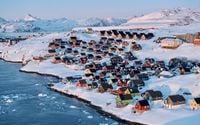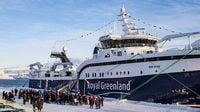Greenland, the world’s largest island and a territory of Denmark, has recently emerged as a focal point in international geopolitics, particularly under the scrutiny of U.S. President Donald Trump. With its strategic location and rich mineral resources, Greenland is increasingly seen as a coveted asset in the race for dominance in the Arctic region.
On the latest episode of ABC’s Foreign Correspondent, North America Correspondent Lauren Day reported from the icy expanse of Greenland, revealing the complexities surrounding the island's future. "It’s a geopolitical battleground," Day noted, highlighting the rising U.S. interest in Greenland. The program shed light on the tensions surrounding ownership, independence, and influence, as the U.S. pushes for greater control over the territory.
President Trump has made headlines with his bold declarations regarding Greenland, stating, "America is going to own it." His comments have sparked a flurry of reactions, particularly from Greenlanders who feel threatened by the prospect of U.S. annexation. Greenland's Prime Minister Jens-Frederik Nielsen has firmly stated, "Greenland is for Greenlanders, and that's how it is, and that's how it's going to be forever." This sentiment resonates with many Greenlanders who desire independence from Denmark, yet recognize their current financial limitations.
As the U.S. intensifies its focus on Greenland, Trump’s rhetoric has raised alarms. He has suggested that all options, including military force, remain on the table for acquiring the island. This has left many in Greenland feeling re-traumatized, as they recall the painful history of colonization by Denmark, which lasted over 200 years. Nive Heilmann, a resident of the town of Illulisat, expressed her community's fears, saying, "I see people worry. I see people and they say they worry that the American military is here next week. When you wake up in the morning and they're just here, that's a scary thought."
Greenland's colonial past has left deep scars, as highlighted by Heilmann, who spoke about the forced removal of children and the suppression of Inuit culture. The country’s Mineral Resources Minister, Naaja Nathanielsen, echoed these sentiments, stating, "The wounds of colonization are still fresh." She emphasized that the Greenlandic people are acutely aware of the implications of Trump's statements, which they perceive as a threat to their autonomy.
Trump has justified his interest in Greenland by citing concerns over Russian and Chinese military activities in the Arctic. He claimed, "Greenland is a very small amount of people, which we’ll take care of, and we’ll cherish them... But we need that for international security." This assertion has drawn skepticism from experts who argue that there is little evidence to support claims of aggressive incursions by foreign powers in Greenland. Andreas Østhagen, a senior researcher at the Fridtjof Nansen Institute, stated, "There is no evidence of any ‘aggressive incursions’ by any actor in Greenland, at least not publicly available."
Vice President JD Vance has also weighed in, describing the U.S. military base in Greenland, the Pituffik Space Base, as inadequately protected from potential threats. He criticized Denmark for not investing enough in the base’s security. However, Denmark has countered these claims, asserting that they are committed to maintaining the security of Greenland and its resources.
Amid these geopolitical tensions, China has attempted to establish a foothold in Greenland, seeking to develop mining projects and construct airfields. However, these efforts have largely stalled due to pushback from both the Greenlandic and Danish governments, often influenced by U.S. pressure. Experts suggest that while China has shown interest in Greenland’s mineral wealth, its actual presence on the island remains minimal, primarily limited to the fishing industry.
Despite the geopolitical maneuvering, many Greenlanders are determined to assert their sovereignty. At a protest in Nuuk on March 14, 2025, demonstrators voiced their opposition to the prospect of U.S. annexation. One protester, who wished to remain anonymous, expressed concern about the implications of Trump's ambitions, stating, "The threat of the possibility of the annexation of Greenland by America is real and frightening."
As discussions about Greenland's future unfold, it is clear that the island's residents are increasingly vocal about their desire for self-determination. Prime Minister Nielsen's unwavering stance against any deal with Trump reflects a broader sentiment among Greenlanders who wish to control their destiny. "Any decision about Greenland will be made in Greenland," he asserted.
In the context of the Arctic's shifting geopolitical landscape, the U.S. administration's approach to Greenland appears to be part of a larger strategy to counteract perceived threats from Russia and China. However, experts warn that this rhetoric may inadvertently undermine Greenland’s autonomy, raising questions about the true motivations behind U.S. interest in the island.
As the world watches, the fate of Greenland hangs in the balance, caught between the ambitions of powerful nations and the aspirations of its own people. The coming months will be crucial in determining whether Greenland can navigate these turbulent waters and emerge as a truly independent entity.
In summary, Greenland stands at a crossroads, with its rich resources and strategic location drawing the eyes of global powers. Yet, the island's inhabitants remain resolute in their desire to shape their future, free from external pressures and historical traumas. The question remains: will the international community respect their wishes, or will the allure of power and resources dictate the island's fate?


